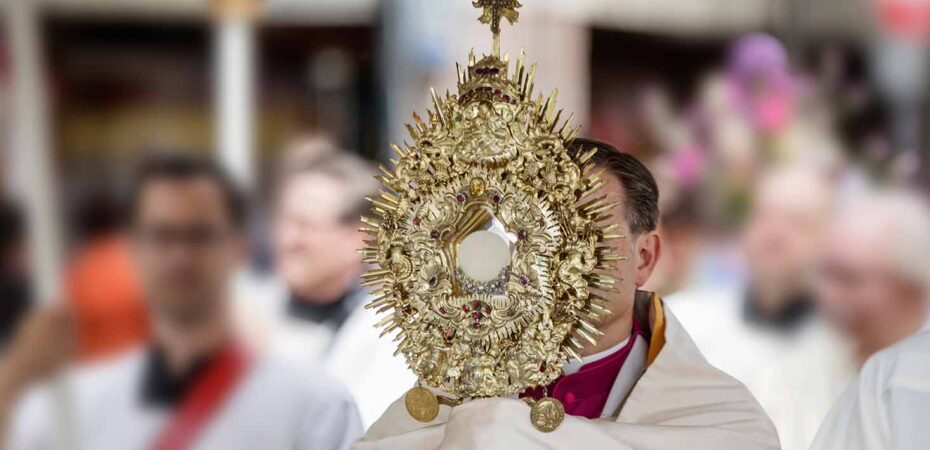Deacon as Eucharistic Bridge
A reflection on ministry and freedom
Deacon Omar F.A. Gutiérrez Comments Off on Deacon as Eucharistic Bridge
In 1988, then Cardinal Joseph Ratzinger’s collection of essays “Church, Ecumenism, and Politics” was published. One of the essays, titled “Freedom and Constraint in the Church,” touches on freedom, or liberation, from the biblical perspective and focuses on freedom as a fruit of identity.
The essay explains that the Greek word for freedom, eleutheria, refers to the freedom that comes from the state of being a son and/or a citizen. It is, to quote the essay, “the opposite of the concept of life as a slave.” The cardinal then applies this meaning to St. Paul’s Letter to the Galatians. In chapter four, St. Paul contrasts by use of allegory the status of Isaac, born of Sarah, and Ishmael, born of the slave woman Hagar. Both Isaac and Ishmael are sons of Abraham; but, according to St. Paul, “Hagar represents Sinai” (Gal 4:25) — that is, the old law now superseded by Christ. Through baptism, we are like Isaac and so freeborn. We Christians ought “not use this freedom as an opportunity for the flesh,” but rather we should “serve one another through love” (Gal 5:13). This service requires a rejection of the works of the flesh, which St. Paul lists in verses 19-21, and requires living the fruits of the Spirit, which he also lists. Ultimately, the service born of authentic freedom requires that “those who belong to Christ [Jesus] have crucified their flesh with its passions and desires” (Gal 5:24).
To summarize, only someone who is truly an heir, someone who belongs by virtue of who or what they are, is free, because only someone who belongs has responsibilities to a place and to his or her neighbor. Authentic freedom, unlike our contemporary definitions, entails service. Freedom is more like the power to choose to live up to one’s responsibilities than to act against them, and those responsibilities are determined by who someone is. The freedom of a Christian, then, is rooted in his or her identity as a son or daughter of God the Father.
A Son of God the Father
What does all this mean for our work in ministry today? Two points might be made.
First, very often the deacon is seen as the doer of certain sorts of things. And there is a tendency within Catholic ministry to emphasize doing things as the pre-eminent source of identity. Interiority is limited to personal reflection on the thoughts, feelings and desires that are the result of the action done. As a result, one’s identity is ultimately subservient to and shaped by doing things.
What does this look like concretely? Imagine the life of a deacon who, after several years of intense ministry, prays little. He says the Liturgy of the Hours. He goes on retreat. This deacon fulfills the duties of the ministries he’s done for years.
From the exterior, there is no difference. He delivers the same homilies and provides the same volunteer and organizational help he always has while carefully avoiding scandals. He is a servant, but he is a servant to his parish’s expectations of what a deacon should do. The parish does not expect much of him, so he simply does those things that a deacon does and does them out of obligation. And it is precisely obligation that marks the life of this deacon. He performs his life as a deacon more than he lives it. He is not a bad man.
He is virtuous enough to know that he should keep his promises and make the effort to be a team player and a valued member of the parish team. He wants to be useful, which is a good thing. But being useful is not what it means to be a Christian, and being useful does not make one free. His identity is as a servant of other people’s expectations, which oblige him to do certain things and no more. He is more like Ishmael than like Isaac.
Second, if freedom is rooted in identity, and identity provides the kind of relationship with God and with neighbor that fosters a life of service in love, then the starting point for the deacon must be to discover his identity as a son of the Father, in service to him through the Church, ordered in being to be permanently available to the servant ministries of Christ. But how might that be expressed? Particularly in this time of Eucharistic Revival, we must see the deacon as a Eucharistic bridge that requires several modes of being in service and which can help a deacon become free to serve.
Hidden and Present
A deacon can be both hidden and present. Just as the Eucharist hides the presence of Christ behind the accidents of bread and wine, so, too, the deacon, when living out in the world appears as a normal American man, hiding the presence of Christ who is a servant to those who suffer. There are many forms of suffering, and so being present can mean lots of different things in different contexts.
Still, the deacon is always hidden, in a sense, behind his being a laborer, a father, a spouse, a consumer, while always one in service to those presented to him by the Lord.
The deacon is hidden in a different way when assisting at Mass, robed in his vestments. The vestments hide the individual, the father, the spouse, the consumer. They show the congregation the order of deacon, the servant who assists at the sacrifice, but his common identity is still there, hidden behind the vestments.
Vulnerable and Solid
A deacon can be both vulnerable and solid. While the Eucharist makes God vulnerable to us, intimately close and even subject to abuse through malice or indifference, the God of Truth cannot be eliminated by any abuse of the Eucharistic species. He will always be who he is, never losing his willingness to suffer abuses for the sake of bringing us closer to him.
Likewise, a deacon’s presence to those who suffer does not just mean physical presence, but rather an openness of heart to and for the other. It is a presence of vulnerability that allows the deacon to suffer with the other in authentic compassion, and sometimes suffering himself the malice or indifference of the person before him. At the same time, the deacon is solid in his faith and does not bend the truths of the Faith for the sake of the wants and desires of those to whom he ministers. Like the Lord, he remains who he is as he points to the truth that will heal all hearts.
A deacon can be both available and set apart. Just as the Eucharist is made available to all the faithful every Sunday and is close to us during adoration, it is still, respectively, set apart in the sanctuary and in the monstrance.
Likewise, a deacon must be permanently available to the needs of those who suffer around him. This does not mean lowering himself in certain ways. Servant of God Dorothy Day warned those in the Catholic Worker movement against “being dirty because the outcast is dirty, of drinking because he drinks, of staying up all night and talking, because that is what one’s guests from the streets want to do, in participating in his sin from a prideful humility, this is self-deception indeed!” (quote slightly edited for clarity). So the deacon must still be set apart, morally sound and above reproach. Availability does not mean self-abasement. It means ordering one’s life in such a way so that, when the Lord calls one to act in love for a neighbor, he is available to do so.
Common and Consecrated
Similarly, the deacon can be common and consecrated. Just as the Eucharist when consecrated is the very body, blood, soul and divinity of Jesus Christ, our Savior, though its appearance and taste and feel is of common bread and wine, so, too, the deacon is ordained and, according to theology, has gone through an ontological change in his very being. But he should avoid seeming unapproachable. He may be personally available to all around him, but if he is not perceived to be common despite being consecrated, then those who suffer will avoid going to him. Part of the deacon’s commonality is that he is very often in the workplace, with a corporation, and in the field of family life, which more and more requires the common touch.
Many more paradoxes of the Eucharist could be drawn out in order to fill out the identity of deacon as Eucharistic bridge. In the end, what St. Paul tells us is that to be free in Christ, and thereby free to minister, will mean reflecting on how one’s life as a deacon exemplifies the nature of the Eucharist, which is the source and summit of our lives as Christians.
DEACON OMAR F. A. GUTIÉRREZ is the president of the Evangelium Institute and is a deacon of the Archdiocese of Omaha.
……………………………………………………………………………………………………………………………………………………..
Encouraging a Spiritual Program
In the Decree for the Ministry and Life of Permanent Deacons, we read: “Deacons should work out a spiritual program which they should periodically share with their spiritual directors. This program should include a period of daily Eucharistic adoration and provide for exercises of Marian devotion, liturgical prayer, personal meditation and the habitual ascetical practices.

“The center of this spiritual itinerary must be the Holy Eucharist since it is the touchstone of the deacon’s life and activity, the indispensable means of perseverance, the criterion of authentic renewal and of a balanced synthesis of life. In this way, the spiritual formation of the deacon will reveal the Holy Eucharist as Passover, in its annual articulation in Holy Week, in its weekly articulation on Sunday and in its constant articulation at daily Mass” (No. 70).
………………………………………………………………………………………………………………………………………………………





